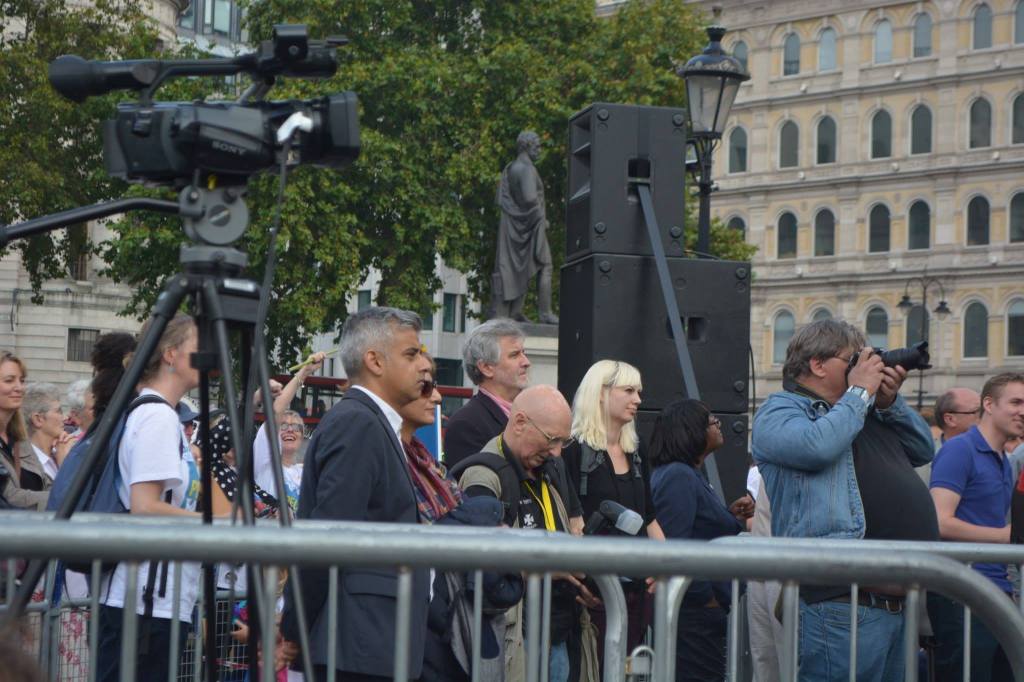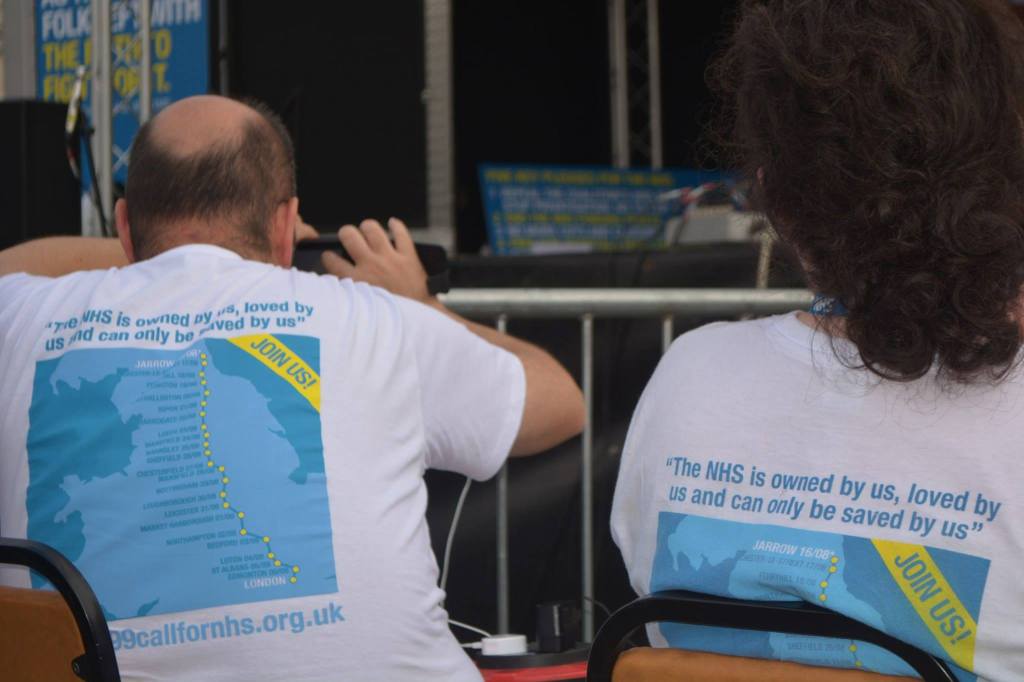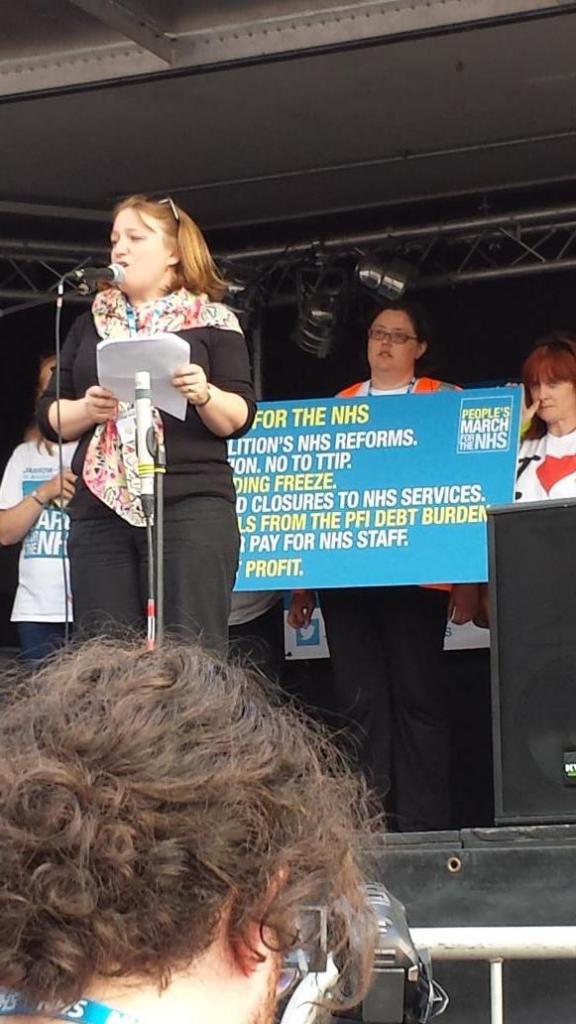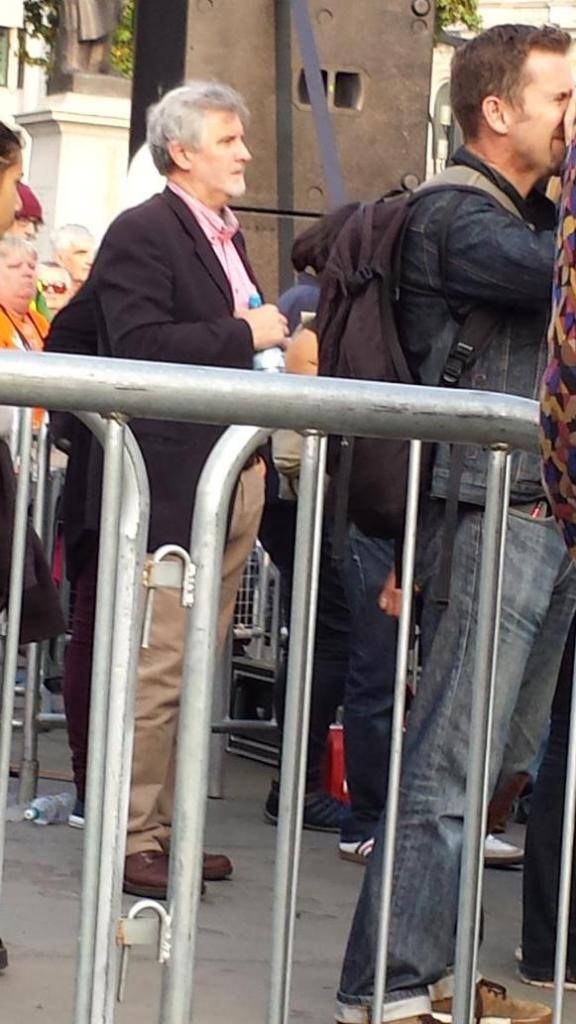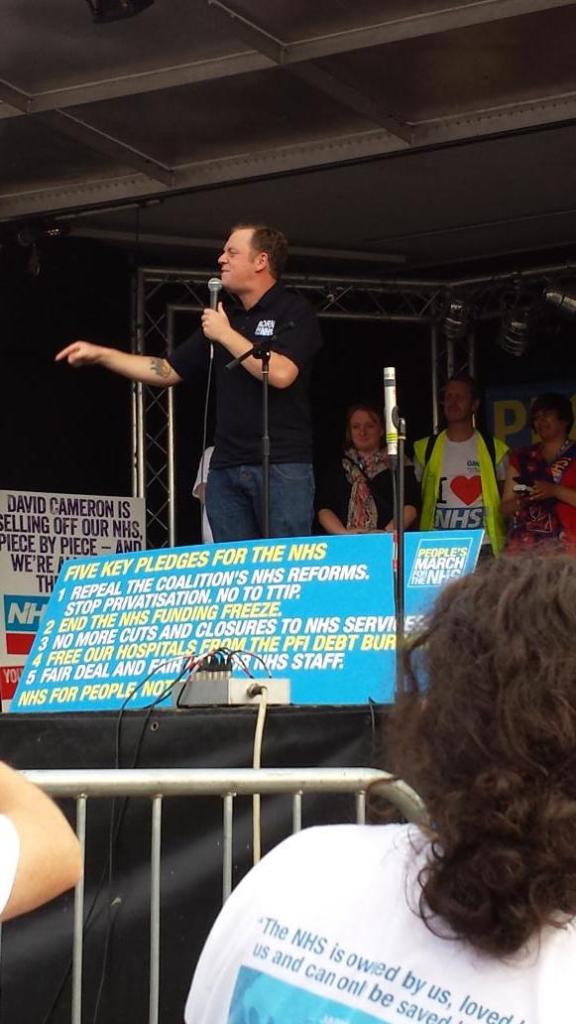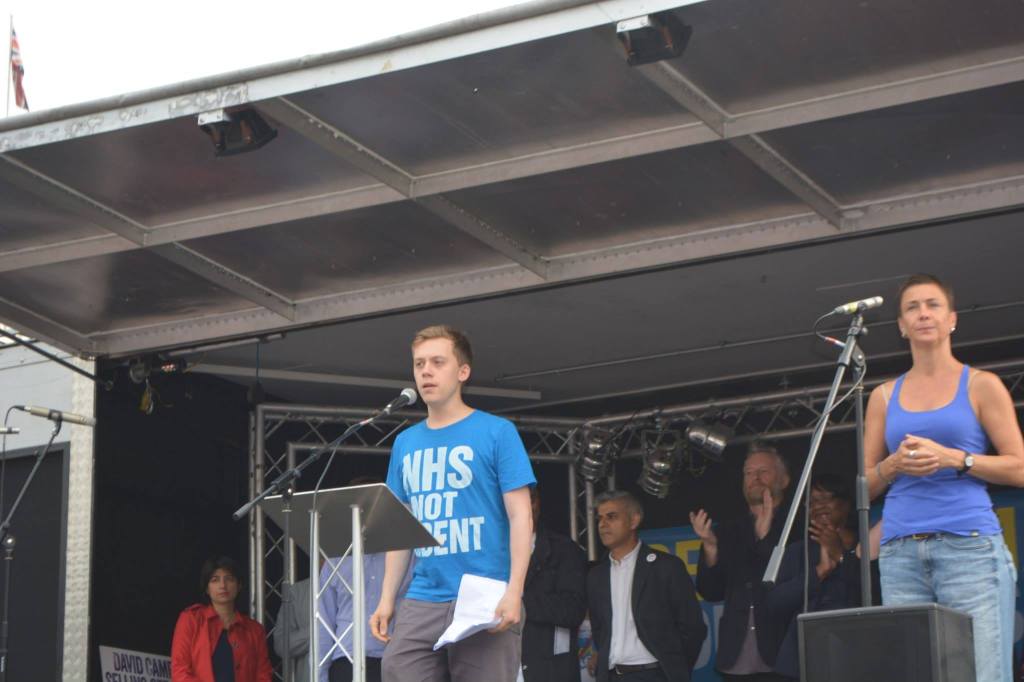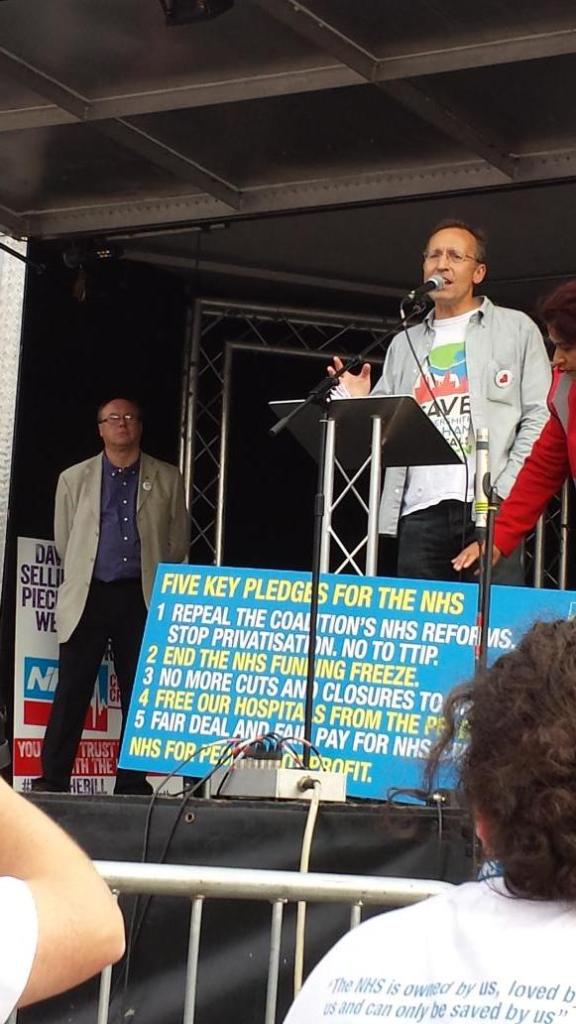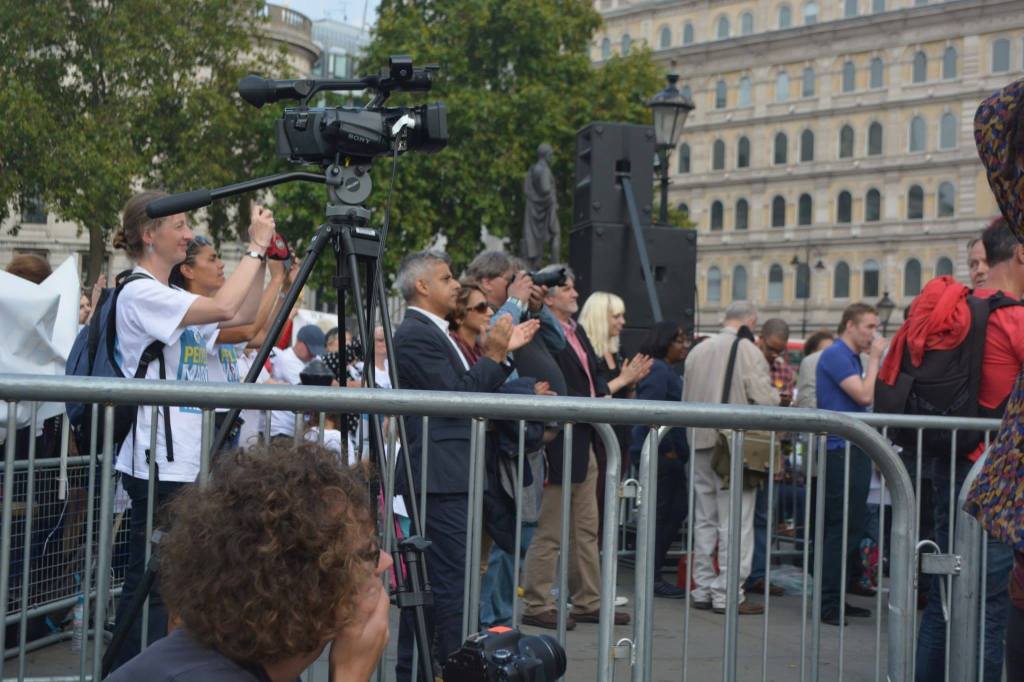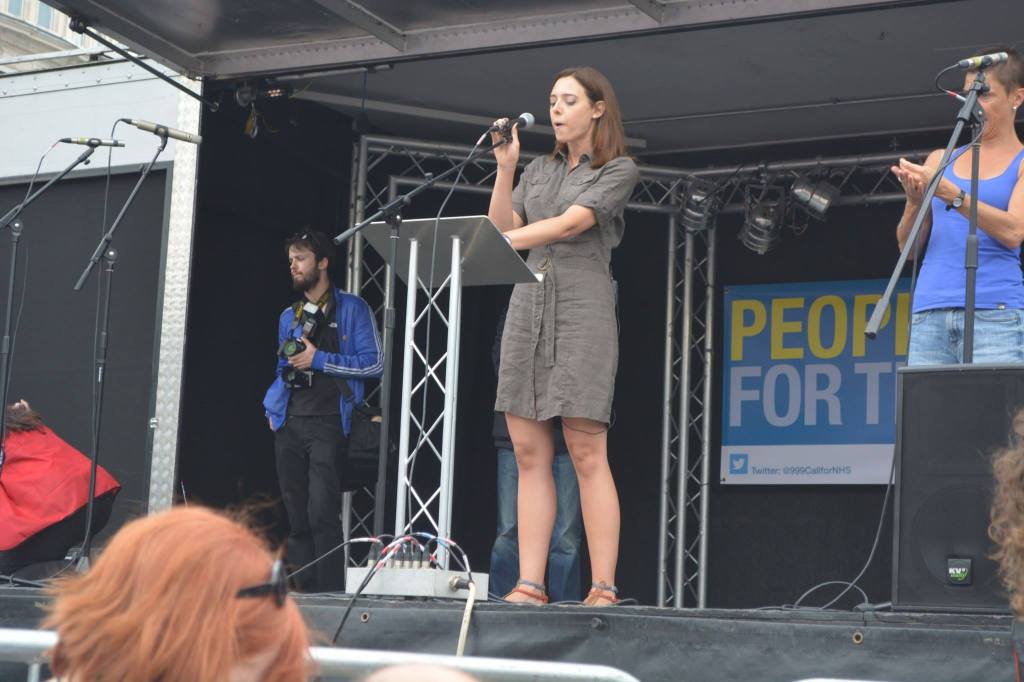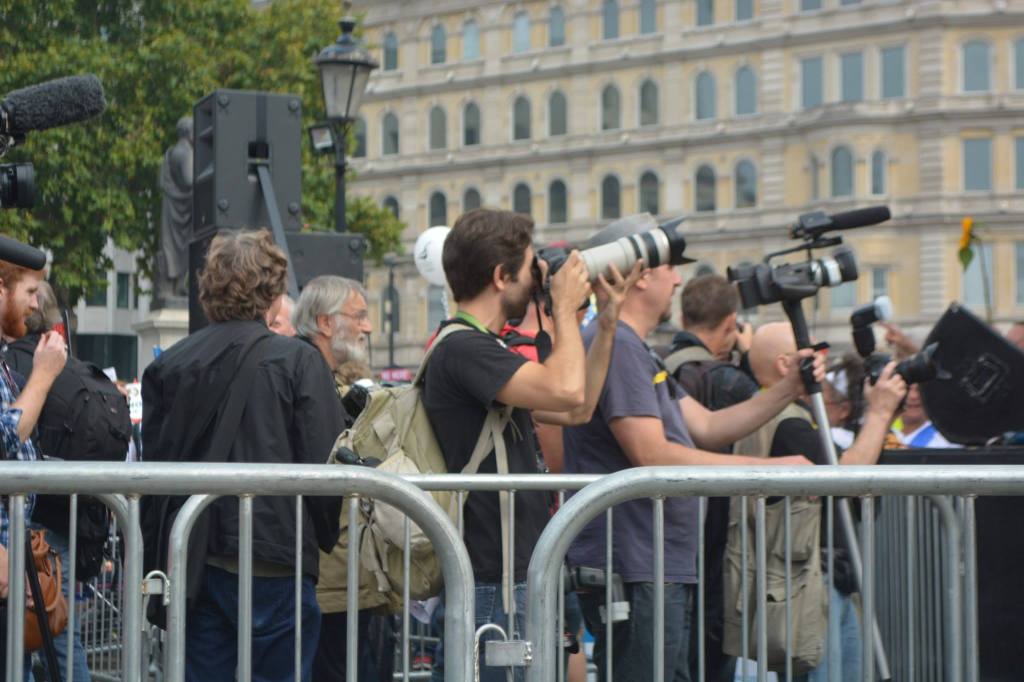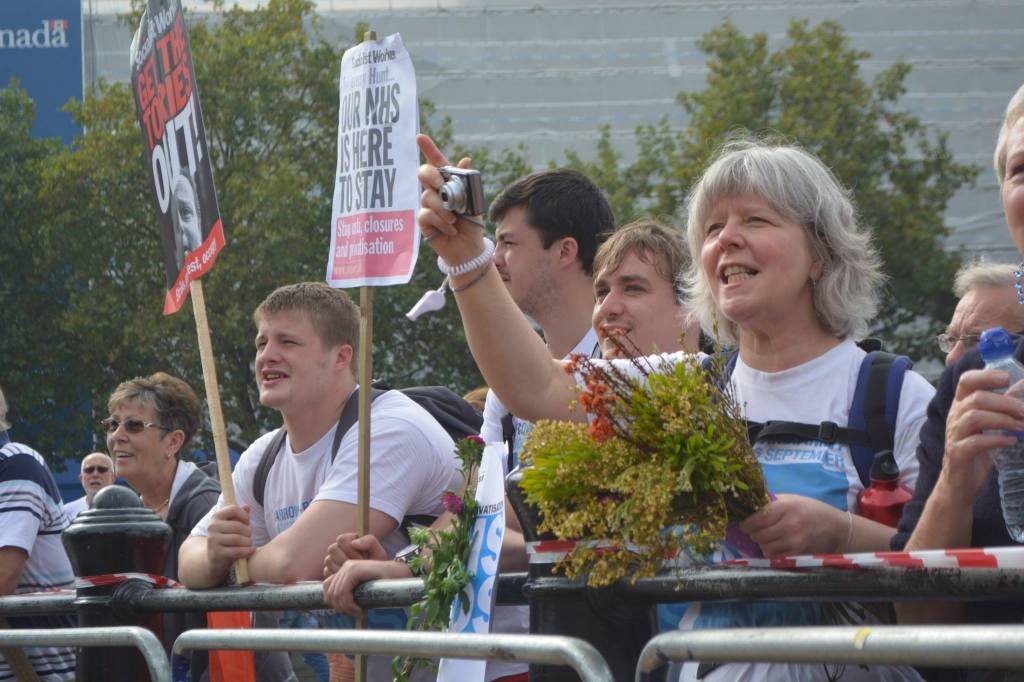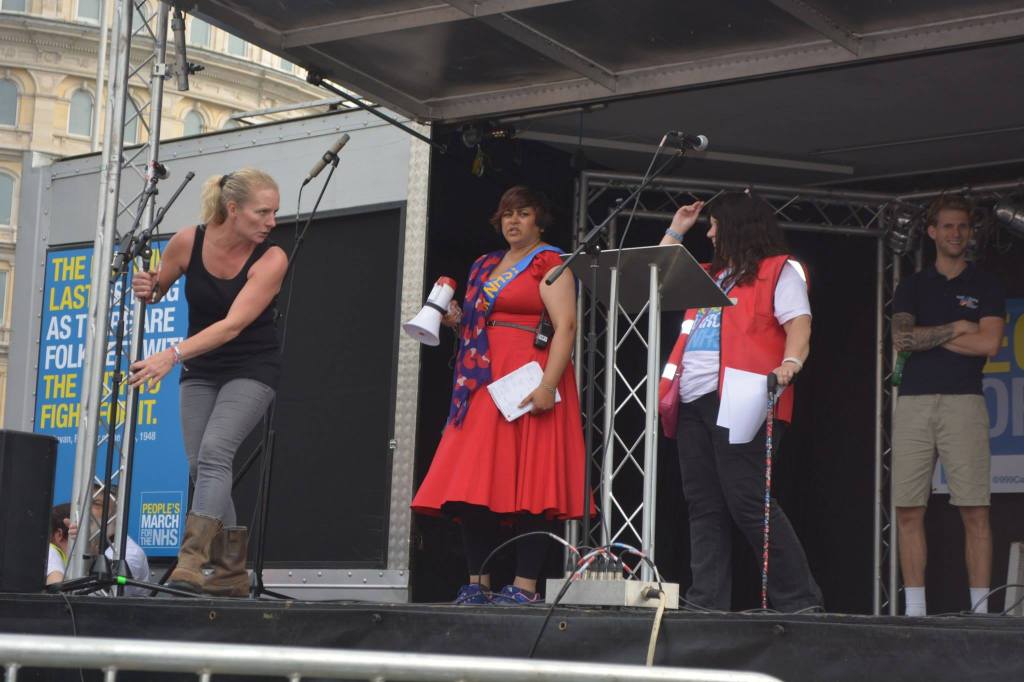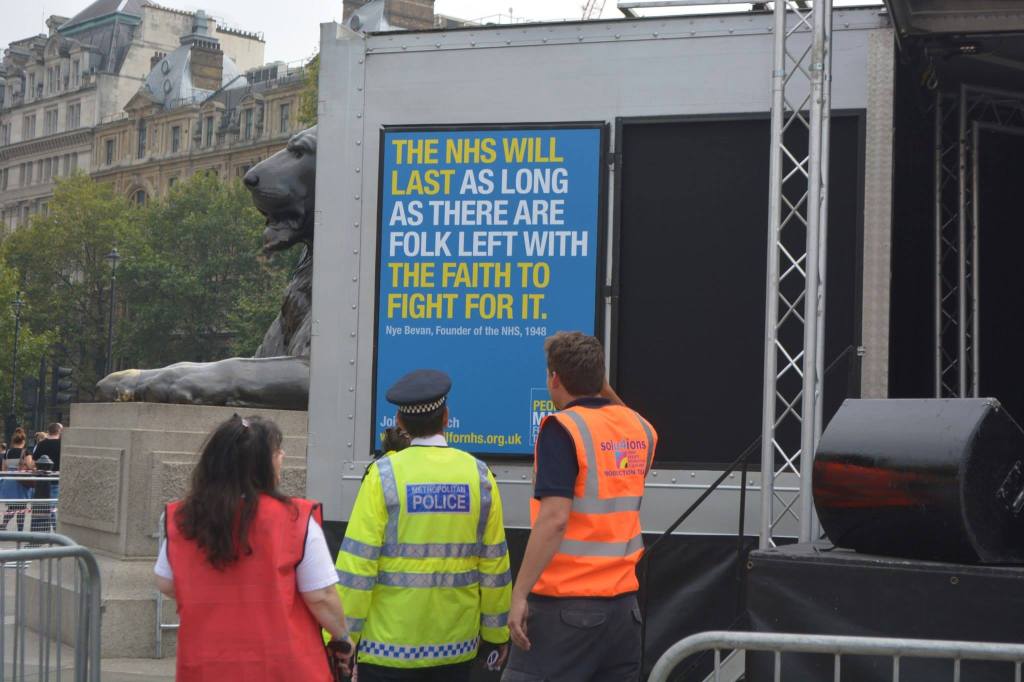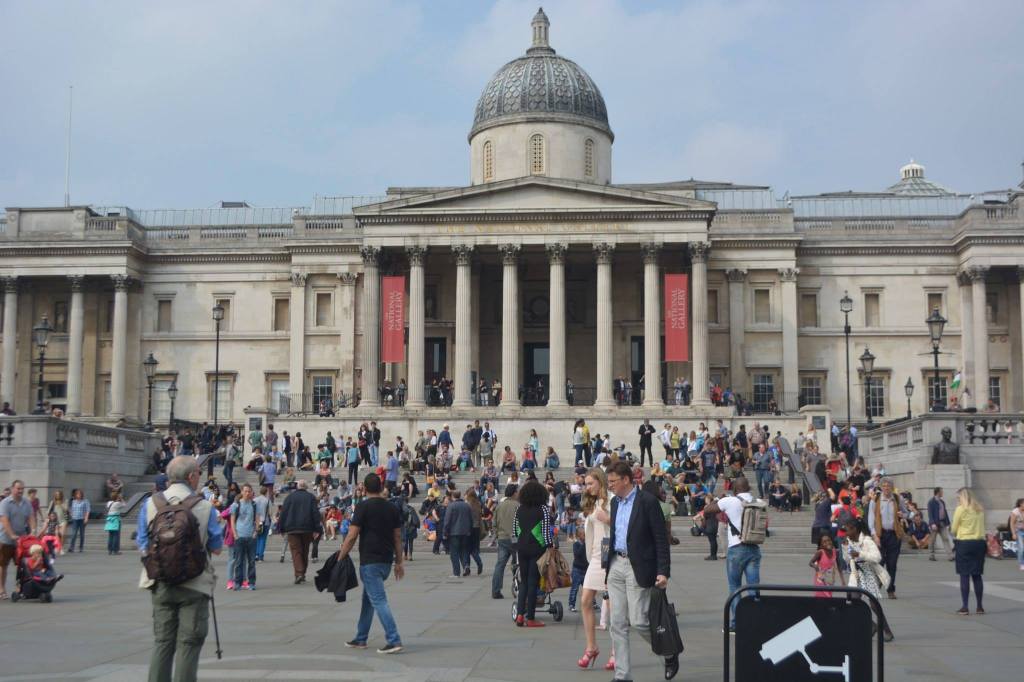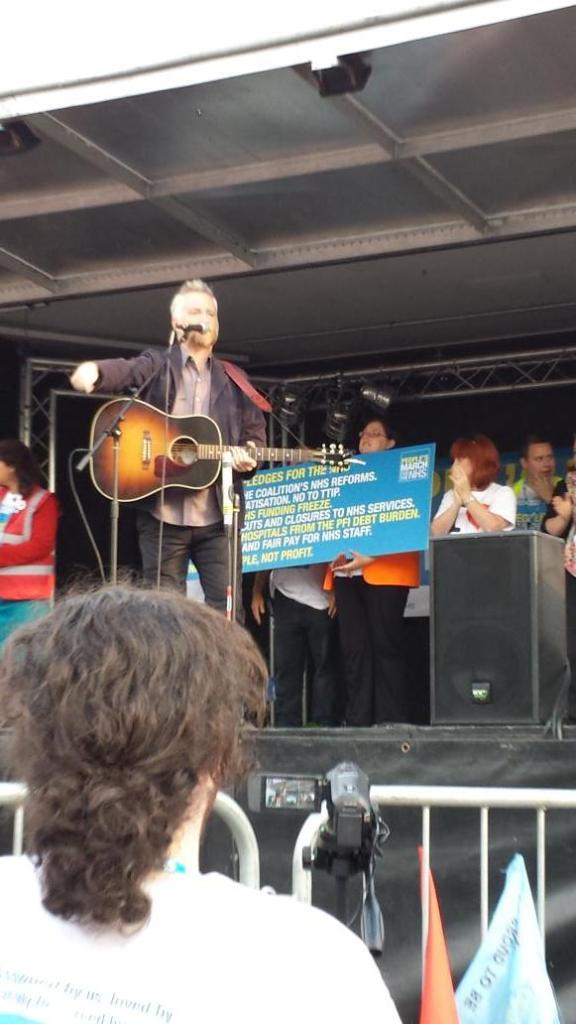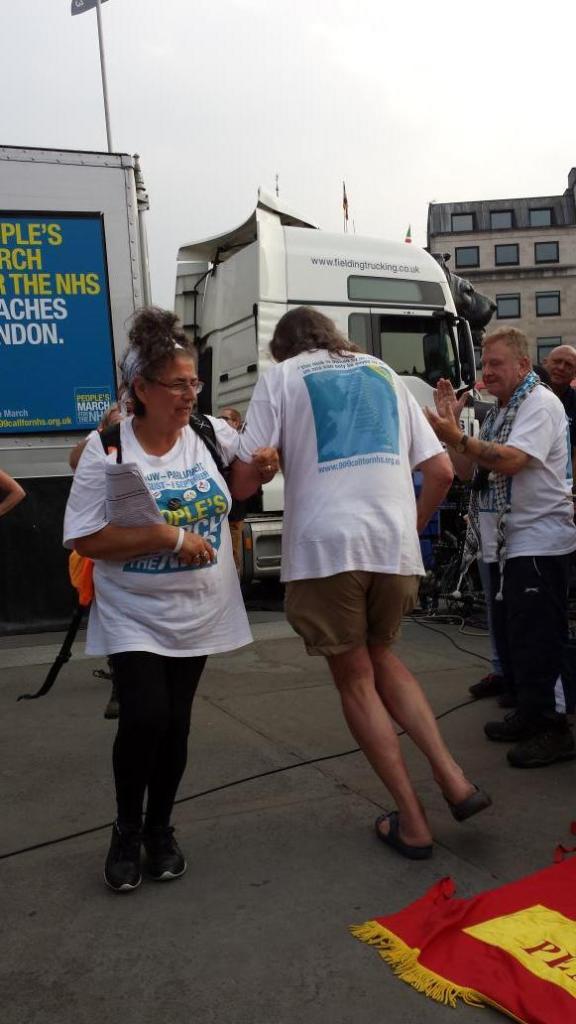Home » Posts tagged 'Andy Slaughter'
Tag Archives: Andy Slaughter
A triumph of optimism defeats cynicism as the Darlo Mums arrive in Trafalgar Square
The stench of sleaze from the backdoor lobbying culminating in the Health and Social Care Act (2012) was unable to overcome the sheer sense of euphoria and triumph of optimism defeating cynicism yesterday. Yesterday was history in the making, as all political parties were put on notice:
“Whose NHS is it? It’s our NHS”.
Whilst numerous governments have elaborated at length about the politics of ownership of public services, the message from the crowd of five thousand or so, within hearing distance of the Houses of Parliament, was loud and clear.
Many famous Labour members of parliament could be seen watching proceedings as the afternoon progressed, including Diane Abbot, Clive Efford, Jeremy Corbyn, Sadiq Khan, as pictured here.
It was a very sunny day here in Central London. There was a charged sense of energy, optimism and solidarity as about five thousand people attended a pro-NHS rally in Trafalgar Square, the culmination of a 300-mile march organised by a group of mothers from County Durham.
The group from Darlington, the Darlo Mums, are opposingthe privatisation of the NHS. It was very emotional when Rehana Azam announced the names of the Darlo Mums, “the most amazing people I’ve just spent the last three weeks with.”
The warmth of the #999CallfortheNHS campaign was evident throughout the whole afternoon. The event was immaculately organised, and was a thoroughly enjoyable event for all.
About 30 people had taken three weeks to march the full 300 miles from Jarrow in South Tyneside, organisers said.
Darlo Mums founder Joanna Adams said: “It’s been magic really. You only have to look over there [at the protesters gathered] to see people are behind the NHS and support what we’re saying. Joanna Adams described the mums as “ordinary”, but I beg to differ – they are entirely extraordinary in my opinion.
Andy Burnham MP, Shadow Secretary of State for Health, broke off all prior arrangements to attend, emphasising the indecency that would have occurred had he not come to represent the political party which had legislated for the birth of the NHS in 1945. Burnham’s speech was equally positive and optimistic about the future, speaking of the need to remedy public over privatisation, integration over fragmentation, people before profit, and collaboration over competition. Again, as is usual for Burnham who has great political gravitas, there was a sense of the current Government simply treading water in office until a person with substantial experience resumes office once again.
Burnham emphasised yet again that an incoming Labour government will repeal the Health and Social Care Act (2012) in its first Queen Speech, and said that it would then negotiate the UK out of TTIP, the transatlantic US-EU free trade treaty. Currently discussions are held in secret.
Sadiq Khan MP said the #Darlomums were the best England have had since 1966. As the MP for Tooting, Khan has been an ideal position to witness the effect the NHS changes have had on the nation’s capital.
Clive Efford MP described his Private Member’s Bill to repeal the damaging competition rules that the Tory-led Government inflicted on the NHS in its Health and Social Care Act 2012. The speech was very well received.
Even Dr Clive Peedell, Co-Chair of the NHS Action Party, called Andy Burnham’s speech “great”, having run 66 km himself to be there. It was announced that Dr Louise Irvine, an inner city GP and BMA council member, would be standing against Jeremy Hunt MP in the South West Surrey seat. Dr Peedell has of course seen at first hand the impact his specialty (oncology) has had on national politics, in the case of Aysha King.
And in the court of public opinion, according to the Daily Mirror last night, Dr Irvine was significantly more popular than Jeremy Hunt. We do know, of course, that the Daily Mirror do not comprise natural friends of Jeremy Hunt.
‘We keep on being told the NHS is unaffordable. THAT IS A LIE.”, said Rufus Hound. This lie has of course been one of the most powerful tools of the media who have called the consistent underfunding of services “unsustainable”.
Billy Bragg warned against blaming all cynicism on what one read in the media, saying that much cynicism was in people’s hearts – and this remained an obstacle for change.
Rehana Azam, as one of the marchers, NHS campaigner and leading light in GMB, and working mum, was one of the stars of yesterday’s event, explaining the necessary steps to get the NHS back on track.
Andy Slaughter, MP for Hammersmith and Fulham, recounted the demolition of his local NHS services, whilst Grahame Morris gave his account, as MP for Easington, of the fight against the Tories to protect the NHS. Andy Slaughter of course has a huge following in West London, and one of the key organisers of yesterday’s event Jos Bell was obviously pleased with the success of the event together with Andy Slaughter.
And finally, Question Musiq explained how he owes his life to the fast action of the Lewisham Hospital A&E in diagnosing his burst appendix, and performed his catchy rap song. Proceeds go to the Lewisham campaign.
A huge well done to everyone! A truly inspiring and memorable event.
Is it right for Labour "not to do God", nor even social justice?
Perhaps religion and politics don’t mix, but there is a certainly an appetite for moral and religious matters amongst some of the wider electorate at large. For ages, right wing critics have emphasised that the right wing “does” religion too, and the left does not have a monopoly on moral or religious issues. A fewer number on the left likewise feel that the right does not have a monopoly on business or enterprise, as they pursue, despite all the odds, the movement of “responsible capitalism”. In amidst all the turmoil of the implementation of the recommendations of the Leveson report, or furore about whether there was an ‘excess number of deaths’ at Mid Staffs (and if so, what to do about it), the Catholic Church elected a new Pope. Pope Francis has said that he wants “a poor Church, for the poor” following his election as head of the world’s 1.2bn Catholics on Wednesday. He said he chose the name Francis after 12-13th Century St Francis of Assisi, who represented “poverty and peace”. Spectators of UK politics will be mindful of the speech made by Margaret Thatcher on her election, for the first time, as Prime Minister outside Downing Street in 1979. Pope Francis urged journalists to get to know the Church with its “virtues and sins” and to share its focus on “truth, goodness and beauty”. He takes over from Benedict XVI, who abdicated last month. The former Argentine cardinal Jorge Mario Bergoglio, 76, was the surprise choice of cardinals meeting in Rome to choose a new head of the Church.
Changing the subject from religious figureheads to Mr Blair is interesting from the perspective of how the English political parties have latterly approached the issue of religion. There is a doctrine that religion does not play a part in politics, and particularly not when going to war with a non-Christian country. Tony Blair is reported to have said he had intended to echo the traditional closing remark of Presidents in the United States, in one of his speeches. These presidents typically sign-off television broadcasts by saying, “God Bless America”. For much of his time in office, Mr Blair was accused of adopting a “presidential” style of leadership, and became close to former American presidents Bill Clinton and George W Bush. His former director of communications, Alastair Campbell, once famously declared “we don’t do God”, when the then Prime Minister was asked about his beliefs.
Wind on a few years and you find the new Archbishop of Canterbury Justin Welby warning that changes to the benefit system could drive children and families into poverty. He said society had a duty to support the “vulnerable and in need”. His comments backed an open letter from bishops criticising plans to limit rises in working-age benefits and some tax credits to 1% for three years. The Department for Work and Pensions said meanwhile stuck to their tried-and-tested line that changing the system will help get people “into work and out of poverty”. Shadow home secretary Yvette Cooper told the BBC’s Andrew Marr Show that Archbishop Welby was “absolutely right” to speak out and described the proposals as “immoral”. So is this the beginning of a divide between the Church and parliament? Probably not a big enough divide who wish to see the disestablishment of the Church altogether.
Many recently would have been alerted by a tweet that used the hashtag ‘blacknoseday’. The sentiment behind it is in fact interesting. David Cameron, alleged to be the man responsible for cutting welfare benefits for the most needy in society, played a cameo role in a Comic Relief video. Nonetheless, Comic Relief made a record amount of money, it is reported. There is a further accusation that Cameron is encouraging us to donate to the charity by waiving VAT from sales of the song and covering this loss to the exchequer with money from the Overseas Budget. So now those people overseas who would have won direct government funding are relying on the UK population downloading a One Direction track.
And are Labour much better? Today, Dr Eoin Clarke’s peaceful rallies against the Bedroom Tax went very successfully, but against a background of discontent within Labour amongst activists. Shadow Cabinet member Helen Goodman MP, who served in the Department of Work and Pensions in the last Labour administration, said in a TV interview that that “We’ve said that the bedroom tax should only apply if people have been offered a smaller place to live and turned it down”. It appears that, time and time again, Labour have made half-hearted criticisms of welfare cuts, but Shadow Work and Pensions Secretary Liam Byrne has already said that Labour will make further cuts to the welfare budget if Labour wins in 2015.
Furthermore, Labour will not yet commit to reversing specific changes contained in the Legal Aid, Sentencing and Punishment of Offenders Act, the shadow justice minister said this week. However, Andrew Slaughter MP promised a future Labour government would ‘rebalance the justice system’ in favour of those seeking civil redress. It would also make more savings from criminal legal aid. The challenge for a future Labour government will be to ‘rebalance the justice system so that it can be seen to give access to justice to all… irrespective of their means’. And in the near future Labour wishes to back Iain Duncan-Smith on some retroactive changes to the law over workfare also. The DWP has introduced emergency legislation to reverse the outcome of a court of appeal decision and “protect the national economy” from a £130m payout to jobseekers deemed to have been unlawfully punished. The retroactive legislation, published on Thursday evening and expected to be rushed through parliament on Tuesday, will effectively strike down a decision by three senior judges and deny benefit claimants an average payout of between £530 and £570 each. Apparently, Labour will support the fast-tracked bill with some further safeguards and that negotiations with the coalition are ongoing.
So is it right for Labour “not to do God”, nor even social justice? All of this appears to be screaming out for Labour to say to its membership, ‘Go back to your constituencies, and prepare once again for a hung parliament.’ Laurence Janta-Lipinski, a pollster from YouGov, has recently revealed his survey which has Labour on 43 percent, the Conservatives on 34 percent and the Lib Dems and Ukip both on 8 per cent – suggested a Labour majority. However, he said that unlike in 1995 and 1996, “Labour are not so far ahead in mid-term to be assured of victory”, and “anyone predicting an election at this time is on to a loser. This far out before an election, I wouldn’t feel comfortable predicting a Labour or Conservative government or a hung parliament because all three of them are still possible. There is a good chance of a hung parliament at the next election. Realistically, it is the best the Liberal Democrats can hope for. Vince Cable is probably right to prepare for a hung parliament.”
There is a real sense now of Labour making its own destiny, where bad luck meets lack of preparation. Having laid the groundwork for the privatisation of the NHS, it might be time for Labour to cut its losses, and to concentrate on its ‘core vote’, or even its ‘founding values’. And it can look this time for Margaret Thatcher ironically for inspiration.
Legal aid debate in the House of Lords
The BBC Democracy Live website will carry the Legal Aid and Sentencing Bill debate in the House of Lords. It is expected that the Coalition government will win this comfortably. This article was first published on this LegalAware blog on September 27 2011.
 This morning, @paulwaugh chaired a #fringe meeting at #Lab11, as part of a series of non-partisan panel discussions to promote awareness of the new Legal Aid and Sentencing Bill. He started off the morning’ proceedings by introduing a @soundoffjustice video about the personal impact of #legalaid cuts to begin, #lab11 #fringe. The panel this morning consisted of Lucy Scott-Moncrieff, Vice President of the Law Society, Steve Hynes from the Legal Action Group (Justice For All Coalition; please listen to @charonqc’c podcast), and Andy Slaughter MP (Labour MP for Hammersmith and Fulham). The event was hosted by DODS, and chaired by Paul Waugh (Editor of PoliticsHome.com).
This morning, @paulwaugh chaired a #fringe meeting at #Lab11, as part of a series of non-partisan panel discussions to promote awareness of the new Legal Aid and Sentencing Bill. He started off the morning’ proceedings by introduing a @soundoffjustice video about the personal impact of #legalaid cuts to begin, #lab11 #fringe. The panel this morning consisted of Lucy Scott-Moncrieff, Vice President of the Law Society, Steve Hynes from the Legal Action Group (Justice For All Coalition; please listen to @charonqc’c podcast), and Andy Slaughter MP (Labour MP for Hammersmith and Fulham). The event was hosted by DODS, and chaired by Paul Waugh (Editor of PoliticsHome.com).
The video presented the wider impact on children and families, explaining that these cuts were hitting the most vulnerable people in society, at their most vulnerable time. The presentation, consisting of personal stories, emphasized that the legal aids are not a ‘cost saving’ at all, and may end up costing money in the long run.
 Steve Hynes explained that the campaign is highly dependent on parliamentaries. The video demonstrates the decimation of civil law, leading to 50% of the service disappearing. This gives the impression that the legal aids are in fact ideologically-driven. Steve explained the need for the campaign to pick its ground. Jackson never wished to preside over the reforms with the cuts occurring. The report from LJ Jackson indeed is very comprehensive as reported by @TheLawyerKaty. Medical negligence is one such area. Steve Hynes thinks that amendments are possible in social welfare for law, involving the higher tribunals, in the House of Lords. The Tories took the view that the higher tribunals were considering conflicts of facts, but Steve argued passionately that this is clearly not the case. Steve feel that it must come into scope. Jim Sandbach succeeded in a Liberal Democrat amendment, getting social welfare back into scope.
Steve Hynes explained that the campaign is highly dependent on parliamentaries. The video demonstrates the decimation of civil law, leading to 50% of the service disappearing. This gives the impression that the legal aids are in fact ideologically-driven. Steve explained the need for the campaign to pick its ground. Jackson never wished to preside over the reforms with the cuts occurring. The report from LJ Jackson indeed is very comprehensive as reported by @TheLawyerKaty. Medical negligence is one such area. Steve Hynes thinks that amendments are possible in social welfare for law, involving the higher tribunals, in the House of Lords. The Tories took the view that the higher tribunals were considering conflicts of facts, but Steve argued passionately that this is clearly not the case. Steve feel that it must come into scope. Jim Sandbach succeeded in a Liberal Democrat amendment, getting social welfare back into scope.
Their Lordships apparently understand the need for disabled people to have rights. There must be independence in legal aid entitlement, and reforms of the LSC could mean that ministers make judicial reviews of their own departments, which is a nonsense. There should be no bias in decision-making, which will affect the credibility of both ‘correct’ and ‘incorrect’ decisions. The Coalition considers that it must consider ‘exceptional cases’, but the reality is that 50% of the family living aid firms will be getting out of the legal aid system – it is therefore fine to talk about ‘exceptional cases’, but it is essential to consider what sort of network there is to support legal aid. Labour when it came into power had a vision of the ‘community legal aid service’, which Steve considers to be a good vision, which the ‘Justice for all’ coalition would like to be part of – Steve will fight for concessions, and needs to campaign for the future. This is about maintaining the ‘rule of law’ and can only be achieved through a civil system.
 Lucy Scott-Moncrieff considered that ‘there is a hearty need for a good practical response’, but there should be a consideration of the social justice ideals underlying the debate. The proposed cuts undermine the rule of law; no-one is above the law, and the flip side is that nobody is outside the law. The European Court of Human Rights suggest that rights are ‘practical and effective, not theoretical and illusory’. Litigating should be a last resort, as it is complicated and uncertain. Going to lawyers is a good step because they can litigate, and the opposite side take the case more seriously. Non-lawyers do talk about their frustration. Children and adults under the age of 24 (@SoundoffJustice) need help. Lucy remarked that it is a good idea to get this publication off the Law Society website (the Law Society has a very active section of its website devoted to legal aid funding). Lucy cited an example of ‘even a 17-year old would be unable to get support’, ‘a person whose identity was stolen and experienced debt problems’, and ‘a student who was unable to access special educational needs’. Lucy also considered welfare benefits through the example of a person who had been given disability living allowance and needed the welfare benefits to prevent eviction – he did not have the legal and medical knowledge to represent himself optimally.
Lucy Scott-Moncrieff considered that ‘there is a hearty need for a good practical response’, but there should be a consideration of the social justice ideals underlying the debate. The proposed cuts undermine the rule of law; no-one is above the law, and the flip side is that nobody is outside the law. The European Court of Human Rights suggest that rights are ‘practical and effective, not theoretical and illusory’. Litigating should be a last resort, as it is complicated and uncertain. Going to lawyers is a good step because they can litigate, and the opposite side take the case more seriously. Non-lawyers do talk about their frustration. Children and adults under the age of 24 (@SoundoffJustice) need help. Lucy remarked that it is a good idea to get this publication off the Law Society website (the Law Society has a very active section of its website devoted to legal aid funding). Lucy cited an example of ‘even a 17-year old would be unable to get support’, ‘a person whose identity was stolen and experienced debt problems’, and ‘a student who was unable to access special educational needs’. Lucy also considered welfare benefits through the example of a person who had been given disability living allowance and needed the welfare benefits to prevent eviction – he did not have the legal and medical knowledge to represent himself optimally.
Furthermore, the criminal justice system also currently relies upon lawyers who can obtain the proper evidence. The Coalition has a responsibility to ‘will the means’, in addition to the rights. The Jackson Reforms must be borne in mind. Legal aid is only a benefit to a very small sample of society. There are lots of people who rely on ‘conditional fee agreements’ – the loser pays the winner costs, and now the winner has pay for his or her own costs. The purpose of damages is to put the person back to the pre-contractual position, but the person is still going to have to pay fees. The “telephone gateway system” does not appear to make intuitive sense, because a person may have difficulty in using a telephone (e.g. a person in ‘community care cases’ in care homes). Where are people going to go if the CAB sytem? They’re going to go to MP surgeries, or councilors. Sound off for justice are continuing to fight.
Lord Willy Bach explained that Labour never threatened the criminal law system as a Labour minister. As a criminal lawyer, Willy feels – in what he has now formulated as ‘the justice gap‘ – that the abolition of criminal law, getting early advice, is ridiculous – as legal aid is meant to address early intervention, upholding defendants’ rights. A lawyer should be able to say whether cases are nonsense, or whether they should progress. It’s practical and moral nonsense. What is the point of ‘rule of law’? The Bill is going to come to the Lords, but the Lords will do their best to mitigate against the effects of poor legislation. Lord Bach urged the need to support the @Soundoffjustice campaign, especially through the use of cros-bench peers or LibDem peers.
 Andy Slaughter MP had just done a fringe meeting for the ‘Young Fabians’. The Bill does not have a prescriptive agenda, and is a sense an extension of what has gone before. It might have a rouse to cut the prison population. The Jackson Reforms will cost the public money. The AA have voted against the Jackson reforms, and this is interesting as motorists constitute a large group of consumers. Restricting access to justice, and tipping the system away from private defendants appear to be unfortunate consequences of the Bill when enacted, according to Andy, therefore all the campaigns promoting awareness of the legal aid cuts are worth supporting.
Andy Slaughter MP had just done a fringe meeting for the ‘Young Fabians’. The Bill does not have a prescriptive agenda, and is a sense an extension of what has gone before. It might have a rouse to cut the prison population. The Jackson Reforms will cost the public money. The AA have voted against the Jackson reforms, and this is interesting as motorists constitute a large group of consumers. Restricting access to justice, and tipping the system away from private defendants appear to be unfortunate consequences of the Bill when enacted, according to Andy, therefore all the campaigns promoting awareness of the legal aid cuts are worth supporting.
